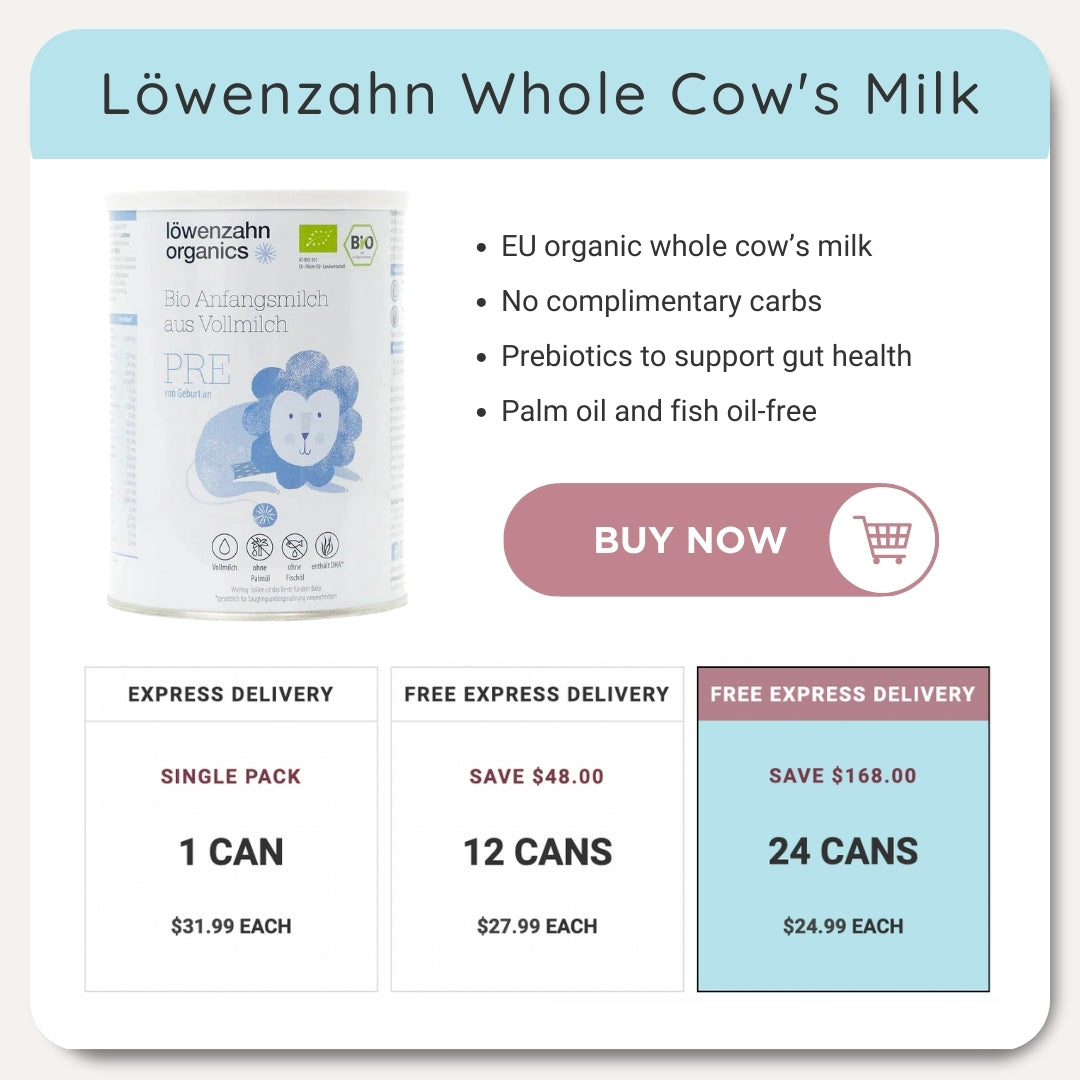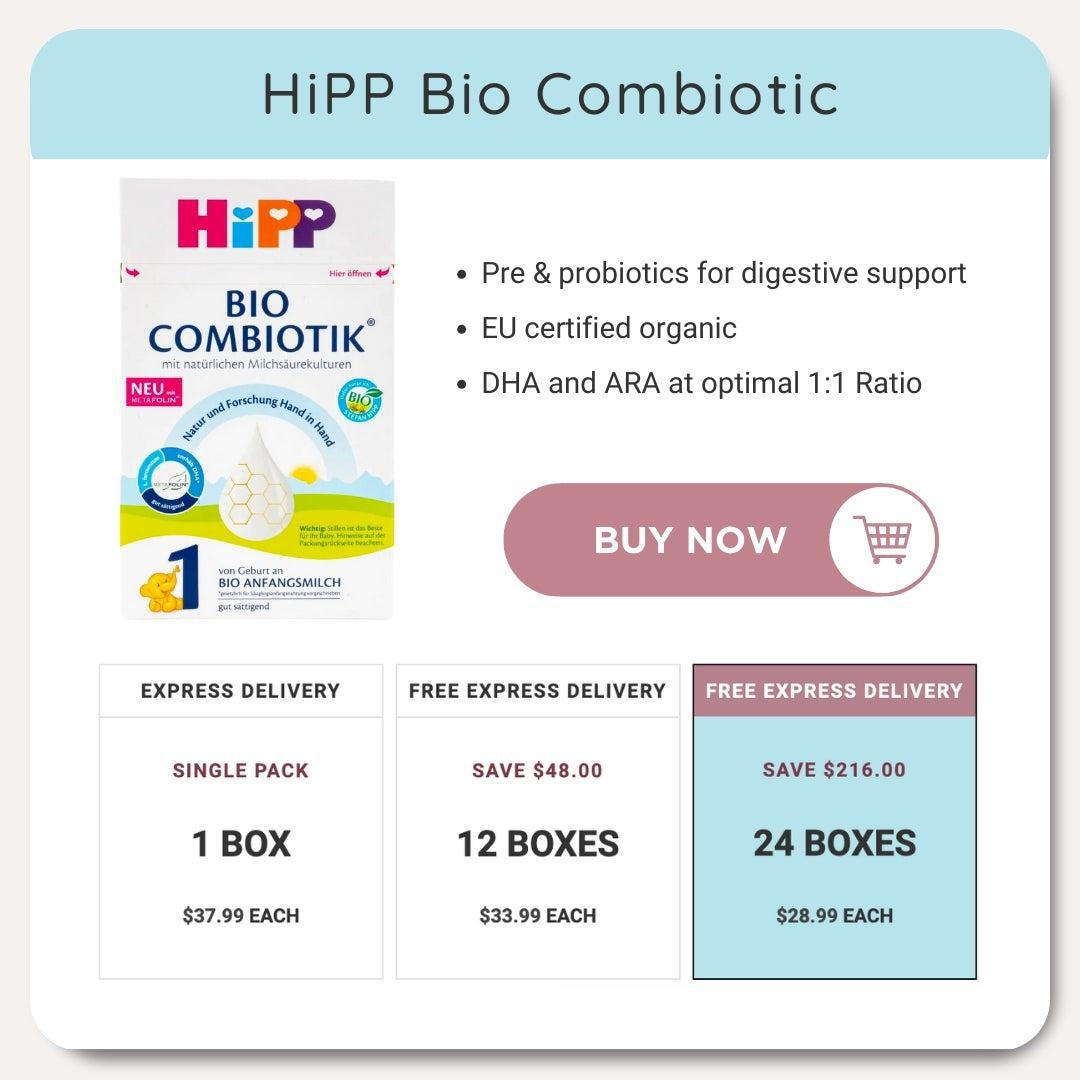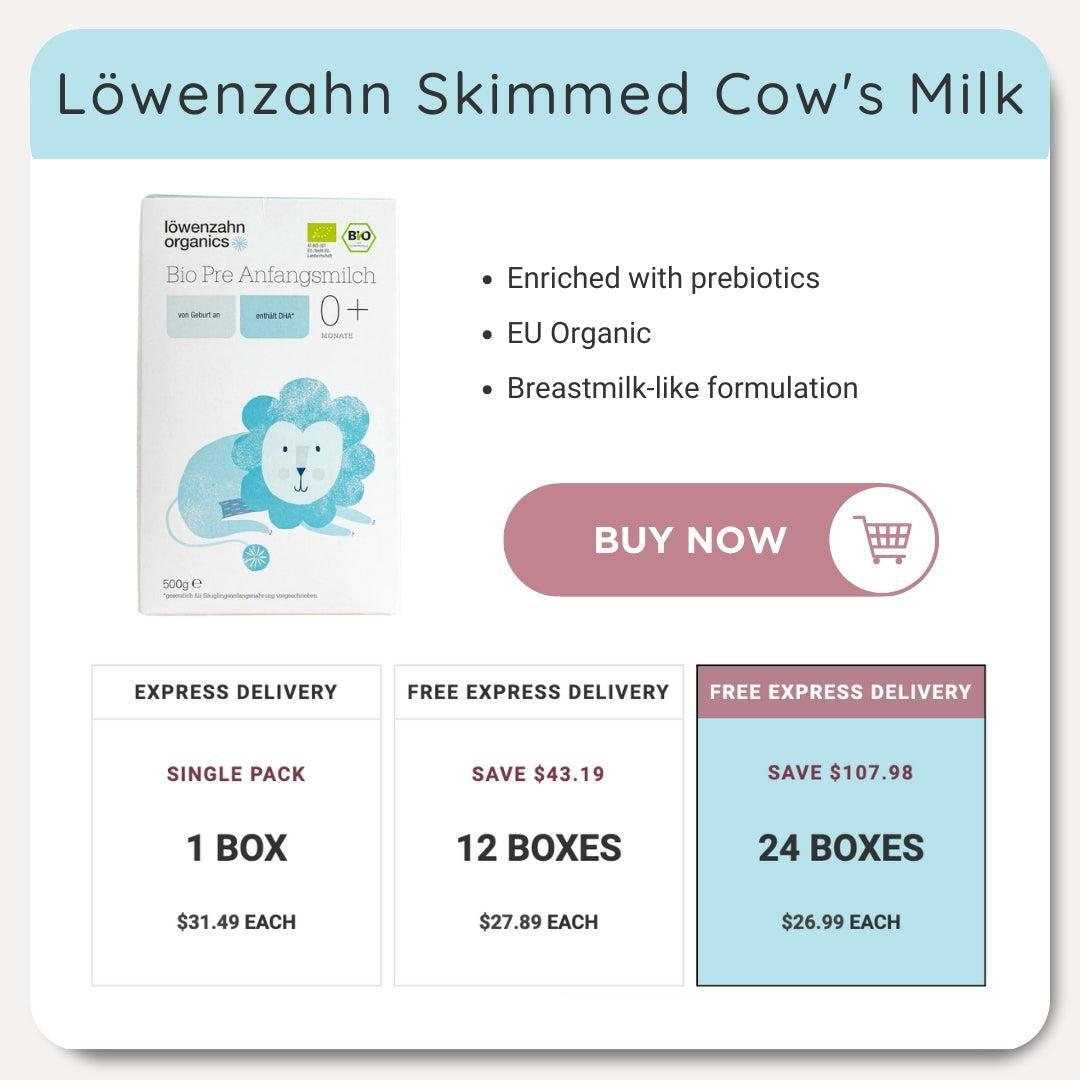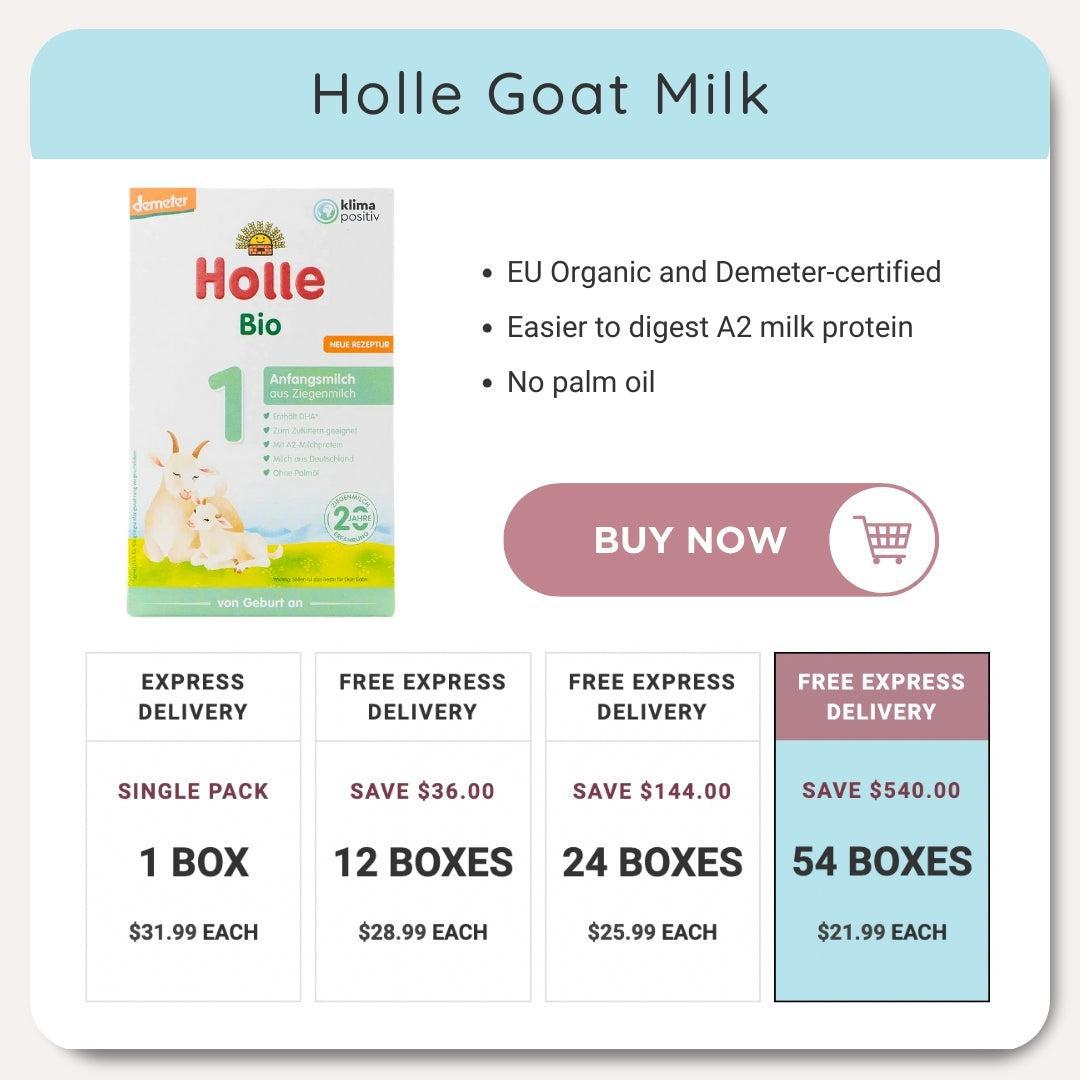Click to Get 2 FREE Boxes/Cans
Click to Get 2 FREE Boxes/Cans
Only New Customers! Click HERE to Get 2 Extra Boxes/Cans for Free With Your First Order.
Only New Customers! Click HERE to Get 2 Extra Boxes/Cans for Free With Your First Order.
BABY FORMULA
Offering new parents top-quality European infant formula from renowned brands like HiPP, Holle, Kendamil, and more. If you’re uncertain about which product to choose, our Formula Finder can help you make the best decision for your baby.
Baby Food
Offering new parents a premium selection of European baby foods, including jars, pouches, cereals, and snacks from esteemed brands like HiPP and Holle.
Best German Baby Formula 2026
by Agustina Fernandez January 05, 2026 14 min read

If you're a parent in 2026, you've likely heard about the rising popularity of European Baby formulas. This surge in interest is in part due to the stricter regulations and higher food quality standards that are upheld by certain European countries, notably Germany, whose infant formulas have set a new benchmark for quality and control.
For those who wish to dive deeper into this topic, we've compiled a list of the best German baby formula in 2026, including popular brands like Löwenzahn Organics, HiPP, Holle, and Lebenswert Bio. We also go into what exactly sets European formulas apart, by exploring their advantages and unique qualities!
Table of contents
- European Formula Advantages
- Why is German baby formula better?
- Ranking The Best Organic Baby Formula From Germany
- Löwenzahn Whole Cow's Milk: Best German Milk Formula Overall
- HiPP Bio Combiotic: German Organic Baby Formula with Cow's Milk
- Löwenzahn Skimmed Cow's Milk: Best German Infant Formula
- Holle Goat: Best German Formula for Babies With Goat's Milk
- Lebenswert Bio: Most Affordable German Milk Formula
- What is the best German baby formula?
- Why does organic German baby formula come in stages?
- European Formula Buying Guide
- Scientific References
European Formula Advantages
While all infant formula is made to provide babies with the nourishment they need during their formative months, European baby formula brands go the extra mile.
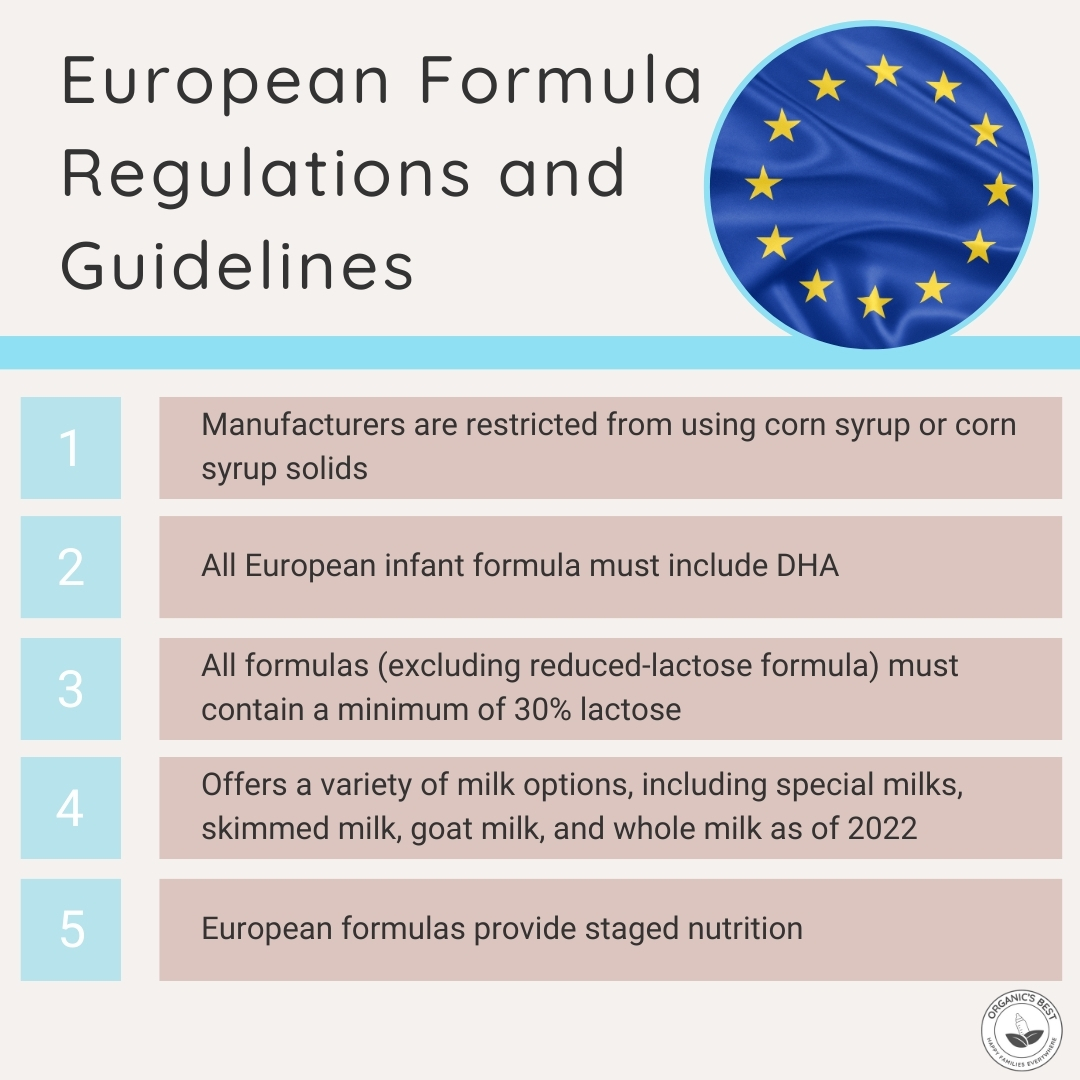
European formula regulations and guidelines:
-
Manufacturers are restricted from using corn syrup or corn syrup solids in milk-based formulas, and there are constraints around the amount of carbohydrates that can be derived from sucrose
-
All European infant formula must include docosahexaenoic acid (DHA)
-
All European formulas (excluding reduced-lactose formula) must contain a minimum of 30% lactose
-
European baby formulas come in a variety of milk options, including special, skimmed, whole, and goat's milk
-
European formula brands provide staged nutrition
On top of that, the organic regulations outlined by the European Commission are some of the strictest in the world, with rules that prohibit the use of genetically modified ingredients (GMOs), chemical pesticide sprays, growth hormones, and antibiotics that are sparingly used only when necessary for animal health.
Why is German Baby Formula Better?
Germany is home to some of the most esteemed and widely used European brands in the world, like HiPP and Holle. Being known for innovation means that German formulas often have features that set them apart. For example, HiPP baby formula uniquely uses probiotics extracted from breast milk.
On top of that, the Demeter certification found on many Holle products is the world's most stringent organic certification, originating in Berlin. Their biodynamic farming practices, established in 1924, have set a new standard for organic agriculture.
Ranking The Best Organic Baby Formula From Germany
We're here to help you on your formula-finding journey! To do so, we have spent hours researching formulas, scrutinizing scientific studies, and analyzing ingredient lists so that we can give trustworthy and reliable recommendations based on the latest scientific findings in infant nutrition. We encourage you to check out our "How We Review Page" for more info on our standards for rating each product.

To make our ranking of organic formulas as comprehensive as possible, we have evaluated each baby formula based on five key criteria: European organic certification, non-GMO ingredients, lactose or milk as the primary ingredient, no added sugars or artificial sweeteners, and the inclusion of ARA & DHA.
We've also awarded bonus points for the inclusion of probiotics and prebiotics and the absence of maltodextrin, starch, and palm oil. Each performance category is assigned 1 point for a maximum of 10 points in total.

Löwenzahn Whole Cow's Milk: Best German Milk Formula Overall
Given that the co-founders of Löwenzahn Organics are moms themselves, they are committed to continuously expanding their European organic formula offerings to cater to every baby’s unique nutritional needs. Löwenzahn Organics' whole milk range offers a distinct advantage over skimmed milk due to its innately higher natural fat content.
Pros ✔️
-
EU organic whole cow’s milk
-
No complimentary carbs
-
Enriched with prebiotics to support gut health
-
Palm oil and fish oil-free
Cons ❌
-
No probiotics
Leading Qualities of Löwenzahn Whole Cow's Milk German Infant Formula
Starting off strong, we've awarded this formula 1 point for being certified EU organic milk. A minimum of 95% of the agricultural ingredients in this formula are sourced from organic farming. Meanwhile, the other 5% in most formulas are essential vitamins and minerals, following additional strict conditions set by the EU. This certification also ensures that the formula is non-GMO.
We were equally thrilled to see that the primary ingredient used in this formula is whole milk, which contains those nourishing natural fats that are stripped away from skimmed milk. This nutrient-packed formula also doesn't have to rely on any added sugars or artificial sweeteners. Babies love its smooth, creamy texture and natural mild sweetness from lactose.
While DHA is added to this German milk formula by law, Löwenzahn uniquely utilizes a plant-based DHA derived from algae oil, which gets points from us for being tasty and sustainable. If that wasn't enough, we were even more impressed to find that the DHA and ARA in the formula are added at an optimal 1:1 ratio, which is similar to breast milk and supports brain and eye development.
Bonus Points Awarded to Löwenzahn Whole Cow's Milk ☆
We were happy to find that, akin to breast milk, this German organic baby formula also contains prebiotic galactooligosaccharides (GOS) to support gut health and optimize digestion. Health experts have found that "the prebiotic effects of GOS and FOS in humans have shown that a daily dose of 4–20 g significantly increases the population of lactobacilli and bifidobacteria in the gut".
In short, GOS acts as food for the existing probiotics, AKA the friendly bacteria already present in a young one's digestive system. However, we have removed one point for not including supplemental probiotics in this formula.
Newborns have delicate digestive systems that cannot handle complex carbohydrates well. Therefore, just like human milk, this German formula for babies relies exclusively on lactose as a carb source. Lactose provides energy for your baby, supports nutrient absorption, and inhibits harmful intestinal bacteria formation.
Because whole milk retains its fat content, this eliminates the need for excessive processing and the addition of other oil-based fats, making this formula palm oil-free! All in all, this baby formula from Germany scores an almost perfect 9/10.
What Parents Say 💬I chose HiPP and Löwenzahn for my baby formula and couldn't be more happy [with] Organic's Best's customer service and their promise to deliver on time. Great friendly service and product. |
HiPP Bio Combiotic: German Organic Baby Formula with Cow's Milk
With almost 100 years of experience behind them, this family-run German company has become one of the leading brands in Europe's organic baby food industry. HiPP's Bio Combiotic range, based on cow's milk, is a fan favourite, containing high-quality ingredients that support digestive health in babies.
Pros ✔️
-
Prebiotics and probiotics for digestive support
-
EU certified organic
-
DHA and ARA at optimal 1:1 Ratio
Cons ❌
-
Starch as a complementary carb in Stages 1, 2, and 3
-
Sustainably sourced palm oil
Leading Qualities of HiPP Bio Combiotic German Milk Formula
Firstly, we were excited to spot the coveted EU Organic label on this product, which also signals that you will not find any GMOs in this formula.
When examining the formula from this family-run company, we noticed that skim milk is the first ingredient listed, and the primary carbohydrate is lactose. Although it has fewer milk fats than whole milk, we've still awarded it a point for mimicking human milk, where lactose is also the main carbohydrate.
Added sugars or artificial sweeteners are not the norm in European baby formula, and they're nowhere to be found in HiPP's formula. Current research states that if a child is exposed to added sugars in infancy, this can lead to an increased intake of sugar later in childhood, making it an undesirable ingredient.
As an added bonus, this formula contains Metafolin® instead of folic acid, which is more easily absorbed by babies and is closer to the folate source found in human milk, and just like Löwenzahn, HiPP also offers DHA and ARA added at a 1:1 ratio.
Bonus Points Awarded to HiPP Cow German ☆
Our gut health directly impacts our immune system. In lieu of this, HiPP contains a proven combination of probiotics originally extracted from real breast milk and prebiotics to aid your baby's gut health.
Adding mild organic starch in some of the later stages of this German milk formula helps create a smooth, creamy formula that gives your baby energy when they need it the most by enhancing the bioavailability of carbohydrates. Nevertheless, starch can also be harder for some babies to digest, so we've docked a point for this fact. However, we do appreciate that this formula has no maltodextrin.
HiPP uses palm oil from fair and sustainable production to create a nourishing fatty acid spectrum. However, some parents prefer to avoid this ingredient because when palmitic acid is not in the beta (sn-2) position, it can bind to calcium in the intestine and form calcium soaps, which may reduce calcium absorption and lead to firmer stools, so we've removed a point from this formula, bringing it to second place with a total of 8/10 points.
What Parents Say 💬
|
Löwenzahn Skimmed Cow's Milk: Best German Infant Formula
Löwenzahn Organics produces formulas that surpass EU nutritional standards in organic quality and are backed by the most up-to-date scientific findings in infant nutrition. Since the company was founded in 2016, it has quickly become one of the fastest-growing baby food companies in the DACH region. Löwenzahn's skimmed milk formula is an award-winning addition to their product range.
Pros ✔️
-
Enriched with prebiotics
-
EU Organic
-
Breastmilk-like formulation
Cons ❌
-
Stages 2 and 3 contain starch and maltodextrin
-
Sustainably sourced palm oil
Leading Qualities of Löwenzahn Skimmed Cow's Milk
Just like many of our favourite German baby formula brands, we were pleased to see that this formula meets EU Organic standards and has no GMOs. Research indicates that GMOs may negatively affect human health, which is why we recommend that your baby avoid them during their formative years. In this regard, Löwenzahn passes the test with flying colours!
Like their whole milk version, this formula uses an equal ratio of DHA and ARA, which surpasses the minimum amount required by the EU. Additionally, they source their DHA from algae, which is tastier and more sustainable compared to fish oil.
Bonus Points Awarded to Löwenzahn Skimmed Cow's Milk ☆
Similar to the previous formula from this German company, this skimmed milk version contains prebiotics (GOS) to help improve gut health and digestion. However, what sets this formula apart is the inclusion of starch and maltodextrin in Stages 2 and 3 to help meet the energy needs of little ones.
There is research suggesting that "the use of maltodextrin as a source of digestible carbohydrates in baby formulas has been suggested to help reduce osmotic load and related intestinal distress". So, if your little one is sensitive to lactose or requires a lower osmotic load for other reasons, they may actually benefit from consuming maltodextrin.
Finally, we commend Löwenzahn for their use of sustainable palm oil certified by the Roundtable on Sustainable Palm Oil (RSPO). However, in accordance with our testing standards, we have removed a point for the inclusion of palm oil, as well as starch and maltodextrin, leaving Löwenzahns skimmed milk formula with a score of 6/10.
Winner of The Best German Baby Formula 2022: Löwenzahn Organics Stage PRE/1
The Stiftung Warentest Foundation was created with support from the German Parliament in December 1964 to provide objective advice and recommendations to consumers based on comparative testing. This organization conducts more than 200 tests each year, covering products from all areas of life. They go through several steps to ensure the tests are non-biased and objectively evaluated.
In 2022, Löwenzahn Organics Stage PRE/1 Infant Formula was awarded the best formula based on tests conducted by the Stiftung Warentest Foundation, which looked at nutritional quality, contaminants, packaging, microbiological quality, and other factors. They won first place up against top German baby formula brands like HiPP!
What Parents Say 💬
|
Holle Goat: Best German Formula for Babies With Goat's Milk
Holle was founded in 1933, making them not only one of the first organic formula manufacturers in all of Europe but also one of the first certified Demeter companies on the market! Currently, Holle's goat milk formula is the only goat milk-based formula made in Demeter quality.
Pros ✔️
-
EU Organic and Demeter-certified
-
Easier to digest A2 milk protein
-
No palm oil
Cons ❌
-
No prebiotics or probiotics
-
Later stages include complementary carbs
Leading Qualities of Holle Goat German
From the get-go, we were impressed with Holle's organic standing, as they meet both EU organic and Demeter biodynamic standards, making Holle formula GMO-free!
Many parents love the gut-supporting benefits of goat milk. Goat milk's proteins are more similar to human breast milk because they're A1 casein-free, and no BCM-7 is produced during digestion. These parameters make it extra gentle and more easily digestible. On top of that, Holle baby formula treats their goats with kindness and care, guaranteeing them access to fresh air 365 days a year!
Keep in mind that despite goat's milk's benefits as a gentle alternative to cow's milk, it isn't suitable for babies who have lactose intolerance or cow's milk allergy.
Thankfully, you won't find any added sugars or artificial sweeteners in this formula. Instead, you'll find nourishing ingredients like fatty acids to promote cognitive development. We appreciate the inclusion of both ARA and DHA in this formula, especially since the DHA is sourced from algae.
Bonus Points Awarded to Holle Goat German Baby Formulas ☆
Since Holle focuses on simple organic ingredients, it does not feature any added probiotics or prebiotics like many of the other EU formulas on our list. Yet goat's milk does contain naturally occurring prebiotics, which help improve digestion and regulate bowel movements.
With the exception of Stages PRE and 1, Holle organic formulas include corn-derived maltodextrin to improve digestion and help your baby feel full longer. However, some parents are not a huge fan of this ingredient as it can seem subpar to lactose.
We also found starch in Stages 2 to 4, added to offer older babies an additional source of energy, but just like maltodextrin, this ingredient is not favoured over lactose. Finally, this formula is impressively palm oil-free, resulting in a score of 6/10, tying it with Lowezahn's skimmed milk formula.
What Parents Say 💬
|
Lebenswert Bio: Most Affordable German Milk Formula
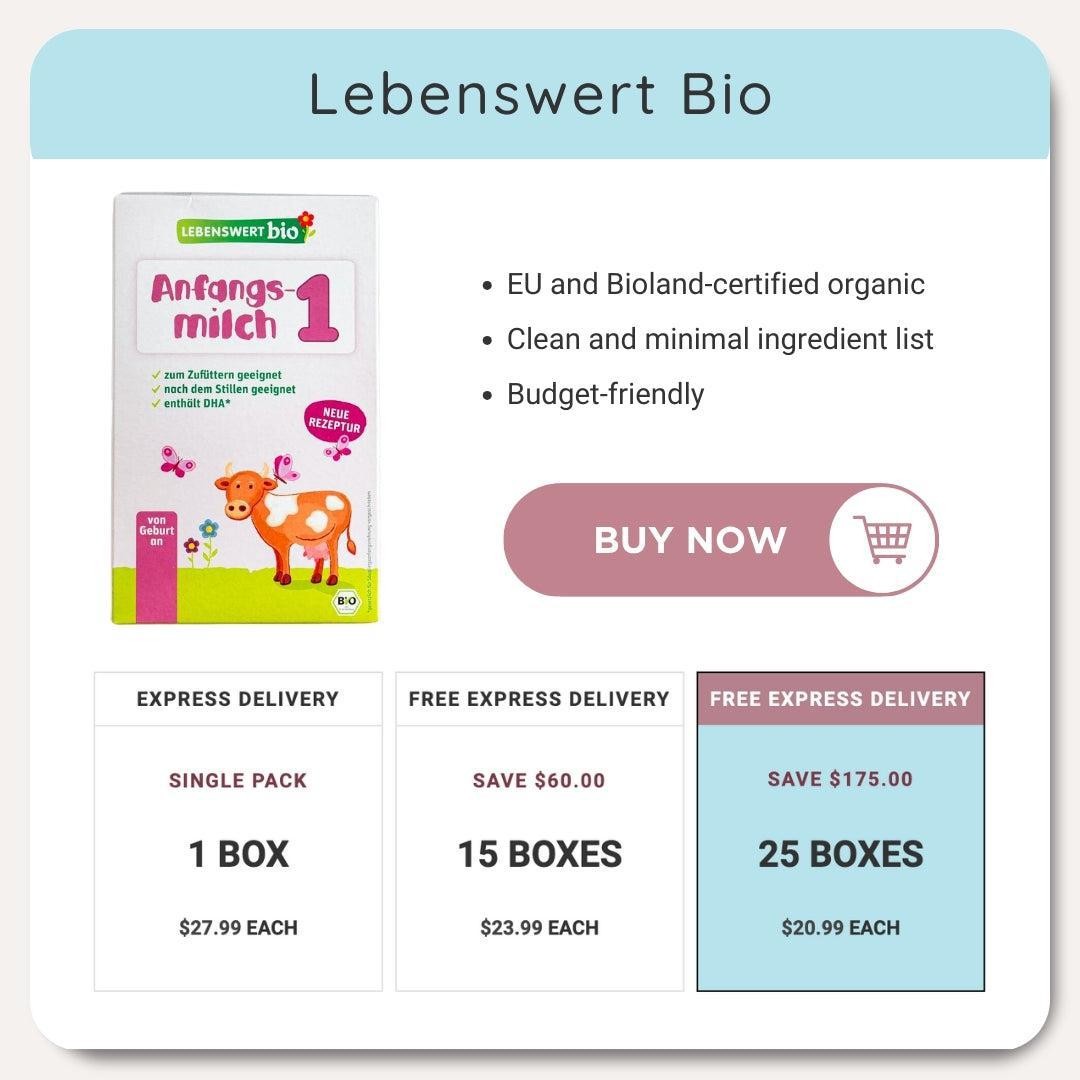
Lebenswert Bio formula is Holle's sister company and was introduced to the market of EU formulas in 2009. Their products are Bioland certified, which is one of the strictest organic regulations in all of Europe. Despite its great quality, Lebenswert infant formula was made to offer parents a more cost-effective formula compared to other leading brands.
Pros ✔️
-
EU and Bioland-certified organic
-
Clean and minimal ingredient list
-
Budget-friendly
Cons ❌
-
Stages 2 and 3 contain complementary carbs
- Contains palm oil
Leading Qualities of Lebenswert Bio
Lebenswert Bio stands apart from the rest as the only German formula certified by Bioland, which is an association dedicated to organic farming in Germany since 1971. We were impressed by this because Bioland standards exceed those of conventional European formulas. Just like the other baby formulas mentioned, Lebenswert Bio is made without GMOs and free from added sugars and artificial sweeteners.
This formula has a base of organic skimmed milk from healthy and happy cows on Bioland-certified organic farms in Germany and Austria. While looking over the ingredient list, we were pleased to find all the essential nutrients necessary for healthy development, such as fatty acids DHA & AA.
Bonus Points Awarded to Lebenswert Bio ☆
We have removed points from this formula for excluding prebiotics and probiotics, but like Holle formula, the goal is to keep ingredient lists as minimal as possible.
Stages 2 and 3 contain complementary carbs, but Stage 1 has a simple lactose base. For this reason, we have removed 2 points. Finally, we found palm oil, and while many parents aren't huge fans of this formula, we do appreciate that this ingredient is sourced sustainably.
What Parents Say 💬We love Lebenswert, and this is the second time we’ve used it with our babies. I struggle with low supply, so I supplement with formula, and this one is so gentle on our baby’s stomach and actually smells and tastes good, unlike formula brands here in the US. I’ll be using Organic’s Best again in the future to purchase formula. |
What is the Best German Baby Formula?
While we are big fans of all the baby formulas discussed above, we want to give a standing ovation to the top-rated formula based on our findings, the Löwenzahn whole cow's milk formula. Its nutrient-rich and gentle formulation makes it an excellent choice for nurturing your baby's development compared to other formulas.
Why Does Organic German Baby Formula Come in Stages?
A feature that differentiates European formulas from their American counterparts is that European brands offer their products in stages. This design is meant to target an infant's specific nutritional needs at different stages of development. These stages range from newborn to toddler, and while most European formulas come in three stages, some brands, like HiPP, offer a wider range.
European Formula Buying Guide
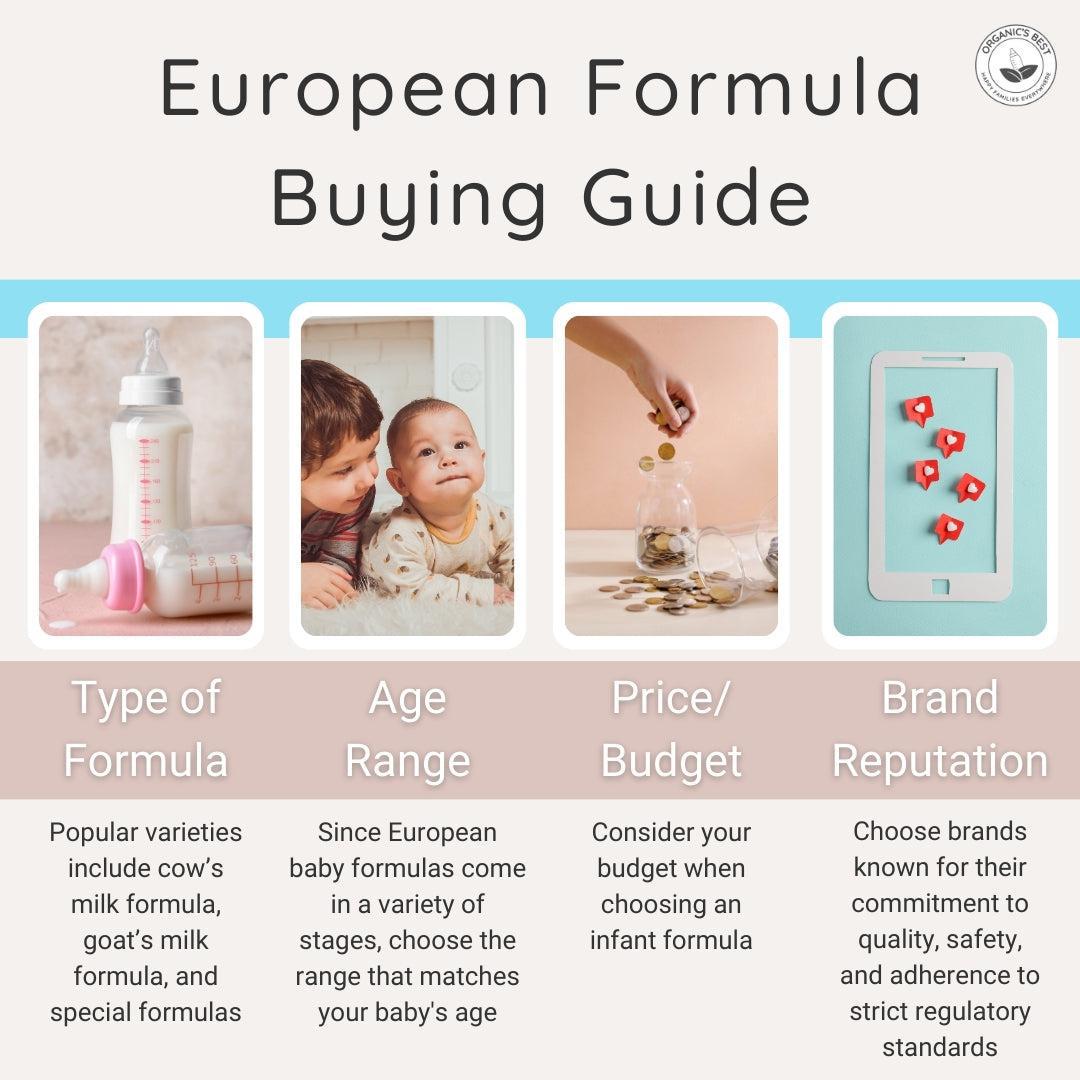
If you are in the market for European baby formula, there are a few factors to consider:
1) Type of European Baby Formula
Considering your baby's nutritional needs is the first step. Keep in mind that the formulas described below may also come in multiple varieties, including powdered baby formulas, concentrated liquid baby formulas, and ready-to-feed baby formulas.
-
Cow's Milk Formula: Pediatricians often recommend cow's milk formula as the primary choice for healthy babies.
-
Goat Milk Formula: Goat milk is a gentler alternative to cow's milk formula as it tends to be easier to digest and may benefit those with sensitivities to cow's milk.
-
Special Formulas: Special formulas (hypoallergenic, comfort, anti-reflux, soy formula, or rice-based formulas) should only be used under the recommendation and supervision of a pediatrician. These formulas are designed to address specific dietary concerns or conditions.
2) Age Range
Since European baby formulas come in a variety of stages, it is important to choose the one that matches your child's age.
3) Price
Feeding your little one shouldn't break the bank, so make sure to consider your budget when choosing between European formulas. Fortunately, our products come in a variety of price ranges to accommodate different financial situations.
As a special incentive, all first-time customers qualify for two free boxes or cans of formula when purchasing 12 or more formula containers from us. Plus, we offer bulk order discounts starting from orders of 6 formulas for all our customers. This means you can save more money with every additional box or can of formula you purchase!
4) Brand Reputation
Our brands are known for their commitment to quality, safety, and adherence to strict regulatory standards. We understand the importance of trust when it comes to feeding your baby, which is why we prioritize transparency in our products.
Conclusion on The Best German Baby Formula
While Löwenzahn's whole milk formula gained the top score today, remember that infant nutrition is not one-size-fits-all. All the German formulas mentioned are top-of-the-line European formulas that not only meet but also exceed EU nutritional requirements. Now it's time to work with your pediatrician to choose the formula best suited for your little bundle of joy!
Scientific References
-
Bakshi, S., Paswan, V. K., Yadav, S. P., Bhinchhar, B. K., Kharkwal, S., Rose, H., Kanetkar, P., Kumar, V., Al-Zamani, Z. a. S., & Bunkar, D. S. (2023). A comprehensive review on infant formula: nutritional and functional constituents, recent trends in processing and its impact on infants’ gut microbiota. Frontiers in Nutrition, 10.
-
Bawa, A. S., & Anilakumar, K. (2012). Genetically modified foods: safety, risks and public concerns—a review. Journal of Food Science and Technology, 50(6), 1035–1046.
-
Clouard, C., Bourgot, C. L., Respondek, F., Bolhuis, J., & Gerrits, W. (2018). A milk formula containing maltodextrin, vs. lactose, as main carbohydrate source, improves cognitive performance of piglets in a spatial task. Scientific Reports, 8(1).
-
Giribaldi, M., Lamberti, C., Cirrincione, S., Giuffrida, M. G., & Cavallarin, L. (2022). A2 milk and BCM-7 peptide as emerging parameters of milk quality. Frontiers in Nutrition, 9.
-
Griebel-Thompson, A. K., Fazzino, T. L., Cramer, E., Paluch, R. A., Morris, K. S., & Kong, K. L. (2023). Early exposure to added sugars via infant formula may explain high intakes of added sugars during complementary feeding beyond maternal modeling. Frontiers in Nutrition, 10.
Disclaimer:
Please be aware that this information is based on general trends in babies, and it is not medical advice. Your doctor should be your first source of information and advice when considering any changes to your child’s formula and when choosing your child’s formula. Always consult your pediatrician before making any decisions about your child’s diet or if you notice any changes in your child. Breastfeeding is the best nutrition for your baby because breast milk provides your child with all the essential nutrients they need for growth and development. Please consult your pediatrician if your child requires supplemental feeding. |
Agustina Fernandez
Dr. Agustina Fernandez earned her medical degree from the prestigious Universidad Nacional de Córdoba, Argentina. With a deep-rooted passion for pediatrics, Dr. Fernandez is currently on the path to specializing in children's healthcare. Recently, she has delved into the vital field of infant nutrition. Her research interests include breastfeeding, infant formula, and baby food in little ones’ formative years. Dr. Fernandez's commitment to this area of study underscores her dedication to ensuring the health and well-being of children from their earliest days.
Leave a comment
Comments will be approved before showing up.
Also in Organic Infant Nutrition and Health Blog

Infant Botulism: Symptoms, Causes, and Safety Tips for Parents
by Agustina Fernandez January 13, 2026 8 min read
Read More
10 Winter Activities for Kids and Toddlers
by Agustina Fernandez January 06, 2026 8 min read
Read More
How to Choose The Best Infant Formula: A Guide to EU Organic Formulas
by Agustina Fernandez January 05, 2026 14 min read
Read More
Reviewed by Dr. Bardha Citaku, MD
-

Dr. Bardha Citaku: Medical Reviewer of Organic's Best Blog
Dr. Bardha Citaku completed her medical studies at the University of Prishtina in Kosovo, where she began her journey into the field of medicine. She has since developed a career in medical research, contributing to projects with notable organizations, including the World Health Organization (WHO).

